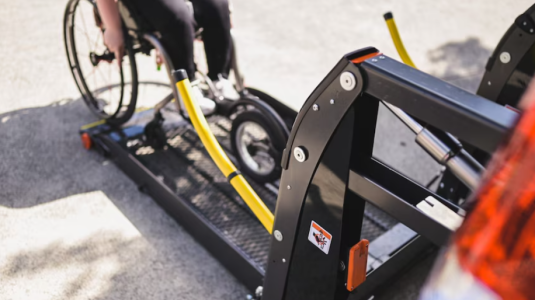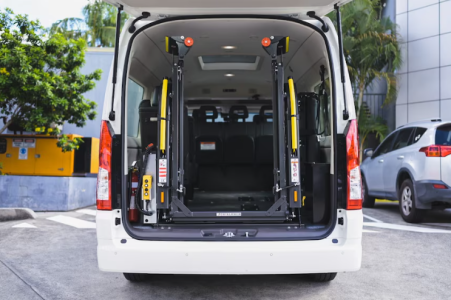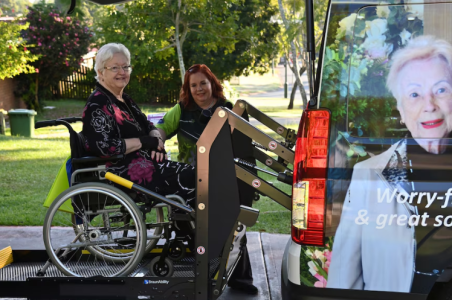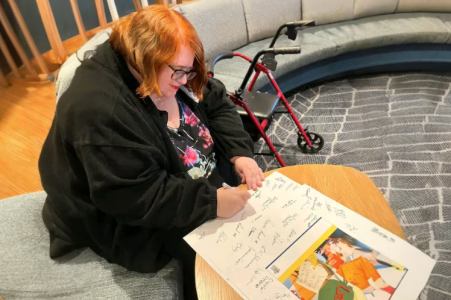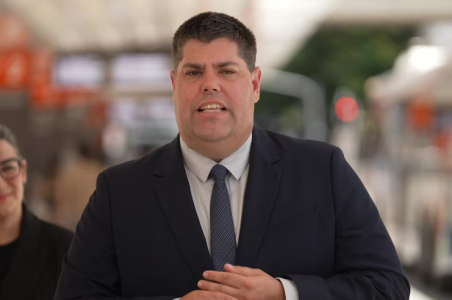Community transport companies refuse new clients as demand surges
By
ABC News
- Replies 9
One of Australia's largest community transport providers is refusing new clients, denying people with disabilities and the elderly access to subsidised travel.
TransitCare delivered more than 300,000 trips in the last financial year, but the Queensland-based not-for-profit organisation's CEO, Terry O'Toole, said they could not keep up with demand.
"We are having to refuse referrals coming in," he said.
Community transport, funded through a mixture of federal, state and commercial contracts, offers transport for people over 65 and people with a disability in capital cities and regional communities.
"Whilst we've got a slogan, 'keeping people connected to their communities', it's not just a service, it's also about social connection," Mr O'Toole said.
With the additional pressures of rising vehicle costs, wages, and insurance combined with an ageing population, community transport providers like TransitCare were beginning to limit how many trips they could make a year.
In the past, TransitCare had been able to absorb over-delivery, but Mr O'Toole said they couldn't afford to do that anymore.
"We're having to comply with what the government says in certain instances. We try to deliver the best service to as many people as possible."
'Human right'
Leanne Claussen, who has a disability, had been using community transport for many years, but when she moved to a different city, she was no longer within the geographical boundary of her provider.
The Queensland resident said the community transport service in her new area told her they didn't have suitable vehicles for her to access their service.
Ms Claussen, who has limited mobility due to having lymphedema, relied on community transport to drive her to work.
"If I was to walk from my house to a bus stop, I couldn't make that," she said.
For months, Ms Claussen funded her own transport, but it became too expensive and impacted her ability to go to work.
"I was paying $120 return trip by Uber every single time I went to work," she said.
She said travelling to work was costing more than she earned.
Ms Claussen, who was deemed not eligible for the NDIS, now receives support through My Aged Care for taxi rides but hoped to access community transport again.
She said the government needed to address the situation with community transport providers for other people with a disability.
"There are people in my circumstance that cannot get to appointments, they cannot go to work, they cannot be out in the community, which is our human right to be able to do so," she said.
'We can't provide anymore'
Mr O'Toole wants the community transport sector to receive the same financial support as the taxi industry for transporting clients with a disability.
"If you do the work, you should get paid for it," he said.
He said his company would make 18,000 trips for clients in wheelchairs every year — it had now jumped to nearly 30,000.
In Queensland, taxi companies received financial support such as a lift payment, where a driver of a wheelchair accessible taxi received an additional $25 for picking up a person who travelled in a wheelchair.
The lift payments are not part of the taxi fare so there are no additional cost to the person with a disability.
Mr O'Toole said it would make an "enormous difference" if community transport providers received the same payment.
"We can't provide anymore, and we certainly can't invest into any more vehicles because of the cost of vehicles that have gone up in the past five years," he said.
Queensland Transport Minister Brent Mickelberg said the state government supported transport services for people with disability, including through the Taxi Subsidy Scheme.
"The Taxi Subsidy Scheme, lift payments, and the Wheelchair Accessible Taxi Grant scheme are currently available exclusively to services provided in taxis," he said in a statement.
"We are starting a review into the approach to regulating and funding accessible personalised transport services, including considering the possible expansion of the TSS to other service types."
Broader transport challenges
People With Disability Australia president Trinity Ford said accessible and affordable community transport was essential for people with disability to fully participate in society.
She said the issues with community transport were part of the broader challenges the disability community faced with accessing other transport like public trains and buses and wheelchair-accessible taxis.
"There's never going to be a one stop shop solution for things. We can't just put all of our money into making public transit accessible and then call that a job done," she said.
"Community transport is one of the really important legs of this system."
Written by Sarah Richards, ABC News.
TransitCare delivered more than 300,000 trips in the last financial year, but the Queensland-based not-for-profit organisation's CEO, Terry O'Toole, said they could not keep up with demand.
"We are having to refuse referrals coming in," he said.
Community transport, funded through a mixture of federal, state and commercial contracts, offers transport for people over 65 and people with a disability in capital cities and regional communities.
"Whilst we've got a slogan, 'keeping people connected to their communities', it's not just a service, it's also about social connection," Mr O'Toole said.
With the additional pressures of rising vehicle costs, wages, and insurance combined with an ageing population, community transport providers like TransitCare were beginning to limit how many trips they could make a year.
In the past, TransitCare had been able to absorb over-delivery, but Mr O'Toole said they couldn't afford to do that anymore.
"We're having to comply with what the government says in certain instances. We try to deliver the best service to as many people as possible."
'Human right'
Leanne Claussen, who has a disability, had been using community transport for many years, but when she moved to a different city, she was no longer within the geographical boundary of her provider.
The Queensland resident said the community transport service in her new area told her they didn't have suitable vehicles for her to access their service.
Ms Claussen, who has limited mobility due to having lymphedema, relied on community transport to drive her to work.
For months, Ms Claussen funded her own transport, but it became too expensive and impacted her ability to go to work.
"I was paying $120 return trip by Uber every single time I went to work," she said.
She said travelling to work was costing more than she earned.
Ms Claussen, who was deemed not eligible for the NDIS, now receives support through My Aged Care for taxi rides but hoped to access community transport again.
She said the government needed to address the situation with community transport providers for other people with a disability.
"There are people in my circumstance that cannot get to appointments, they cannot go to work, they cannot be out in the community, which is our human right to be able to do so," she said.
'We can't provide anymore'
Mr O'Toole wants the community transport sector to receive the same financial support as the taxi industry for transporting clients with a disability.
"If you do the work, you should get paid for it," he said.
He said his company would make 18,000 trips for clients in wheelchairs every year — it had now jumped to nearly 30,000.
In Queensland, taxi companies received financial support such as a lift payment, where a driver of a wheelchair accessible taxi received an additional $25 for picking up a person who travelled in a wheelchair.
The lift payments are not part of the taxi fare so there are no additional cost to the person with a disability.
Mr O'Toole said it would make an "enormous difference" if community transport providers received the same payment.
"We can't provide anymore, and we certainly can't invest into any more vehicles because of the cost of vehicles that have gone up in the past five years," he said.
Queensland Transport Minister Brent Mickelberg said the state government supported transport services for people with disability, including through the Taxi Subsidy Scheme.
"The Taxi Subsidy Scheme, lift payments, and the Wheelchair Accessible Taxi Grant scheme are currently available exclusively to services provided in taxis," he said in a statement.
"We are starting a review into the approach to regulating and funding accessible personalised transport services, including considering the possible expansion of the TSS to other service types."
Broader transport challenges
People With Disability Australia president Trinity Ford said accessible and affordable community transport was essential for people with disability to fully participate in society.
She said the issues with community transport were part of the broader challenges the disability community faced with accessing other transport like public trains and buses and wheelchair-accessible taxis.
"There's never going to be a one stop shop solution for things. We can't just put all of our money into making public transit accessible and then call that a job done," she said.
"Community transport is one of the really important legs of this system."
Written by Sarah Richards, ABC News.

